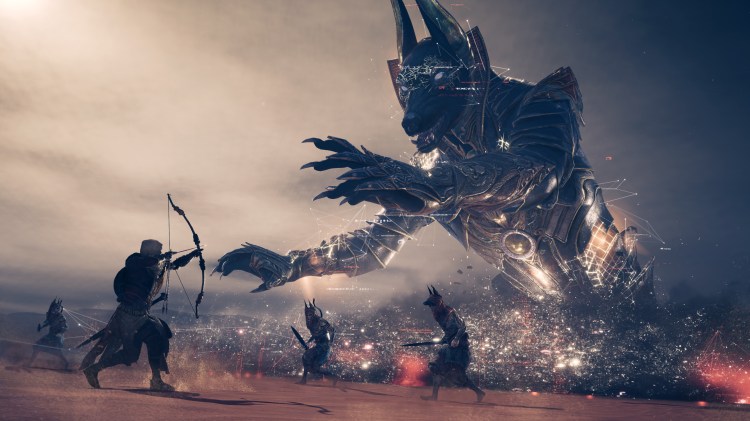Assassin’s Creed: Origins is a stunning tour of ancient Egypt. As Bayek of Siwa, a seeker of justice and protector of the people, you’ll scale pyramids, climb the Great Sphinx, and scour silent tombs full of lost treasure and winding passageways. It’s the latest installment in Ubisoft’s series that’s renown for its sweeping vistas and aerial sneak kills.
Origins is out now on PC, Xbox One, and PlayStation 4, which I played it on. Bayek’s a compelling protagonist, with a convincing performance from British actor Abubakar Salim that brings by turns stoicism, warmth, nostalgia, and unrelenting righteous hatred. The writers weave Egyptian lore and culture into the narrative, and it’s heavy with symbolism.
That said, it’s not all sunshine and lotuses along the Nile. It has some weaknesses, most noticeably with the open world gameplay as well as a weak third act.
[This review has spoilers. — Ed.]
Check out our Reviews Vault for past game reviews.
What you’ll like
A stunning world to explore
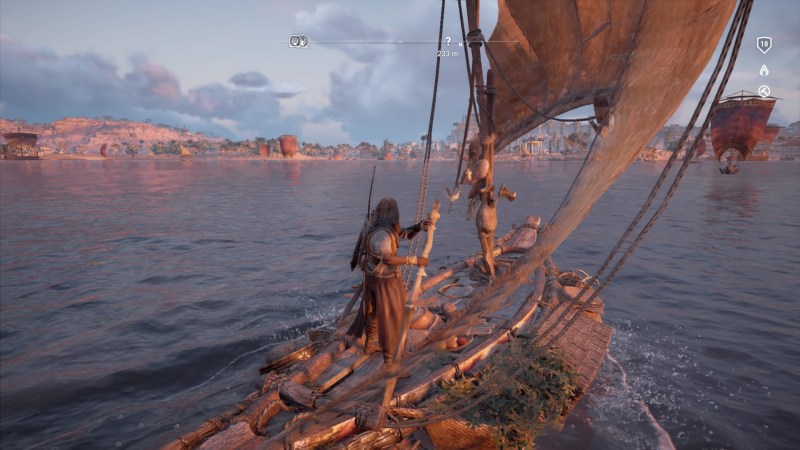
Above: It’s a beautiful day to go sailing.
Origins is beautiful, and traversing the roads between iconic ancient cities like Alexandria and Giza never ceases to amaze. It’s a huge map, so fast travel options exist. But when I’ve been forced to hoof it the old-fashioned way along dusty paths and by boat along canals and across lakes, Assassin’s Creed’s take on Egypt has been a spectacle to behold: sunsets on shimmering waters, murky swamps full of lurking crocodiles, lush farmlands, and massive ruins rising from sandy dunes.
Occasionally, you’ll get caught up in a sandstorm, which sweeps across the landscape and plunges you into a deep blood orange haze. Specters and hallucinations begin haunting your steps and bandits can fall upon you in an instant, taking advantage of the limited visibility. Origins makes good use of its environment and each major area has its own personality. When you reach Memphis, the air is still, and the sounds are hushed. It’s a gorgeous city that’s fallen under a plague, and it’s clearly withering in the grasp of some dark power. Even the rivers seem dull and uninviting, a decided difference from the clear waters of Lake Moeris.
Each of the cities you visit yields stories and snippets of ancient Egyptian life. You hear about merchants who sell forgeries from faraway towns, and you visit temples and learn about their gods and religious orders.
Mysterious temples
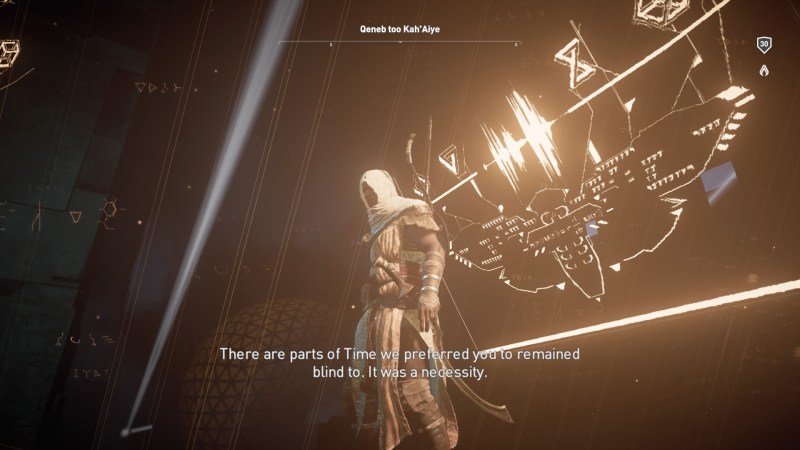
Above: Bayek discovers a secret message from beyond time and space.
Some of the coolest locations you’ll visit are temples scattered throughout the world and filled with the kind of secrets you won’t find on your map. Most of the places you’ll visit will be fortified army camps and rural villages, but sometimes you’ll enter an area that’s unlike any others. For instance, there’s one temple I stumbled upon in the dead of night where I had to move around mirrors and follow a path of moonlight. It appeared without any context. There weren’t any animals or enemies around. There were only cold, lonely walls, rising up from the sands and towering over me, challenging me to solve its puzzle.
Most of the locations prompt you with objectives — loot the treasure, kill the captain, find the papyrus puzzle pieces — which can feel a little like you’re just checking off items on a to-do list. However, the temples have an eerie, mysterious vibe that feel genuinely special, like you’re really exploring ruins that have been left behind by time.
They also yield up little bits of story that pertain to the overarching narrative, not just what’s happening in ancient Egypt. It’s a little peek behind the veil at the sci-fi machinery that runs at the heart of Assassin’s Creed.
Dividing time between vengeance and duty
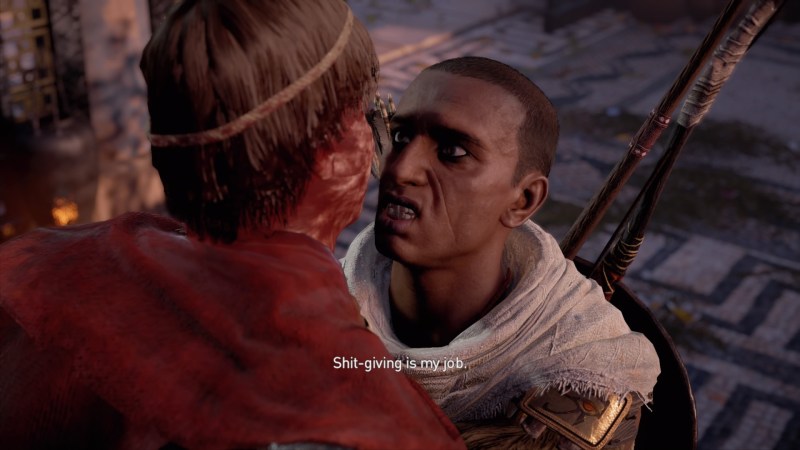
Above: You heard the man.
Bayek is a Medjay, a member of an elite force that serves the pharaoh and protects the lands. At the start, the Order of the Ancients captures him and his son Khemu and attempts to extort information from him. In the ensuing scuffle, he accidentally kills Khemu with a blade meant for their captors. From then on, his story is one of vengeance — tracking down the Order and assassinating them one by one in both retribution and to prevent them from spreading further corruption in Egypt.
As Bayek searches for justice, he also gets pulled into myriad tasks for commoners. Side quests are necessary in that they enable you to gain experience points and level up, so you can unlock skills such as a charged heavy attack and brandishing fire bombs.
Mainly, these odd jobs give a peek into what everyday life is like under the rule of the pharaoh Ptolemy XIII. They also offer contrast between Bayek’s duties as Medjay and his personal journey as a grieving father. When the villagers implore him to stop bandits, avenge family members’ deaths, and retrieve stolen items, they sometimes invoke that responsibility. “You’re the Medjay,” they tell him. “Aren’t you supposed to help us?” The tension between his duties and his bloody path of revenge is intriguing.
Solid combat
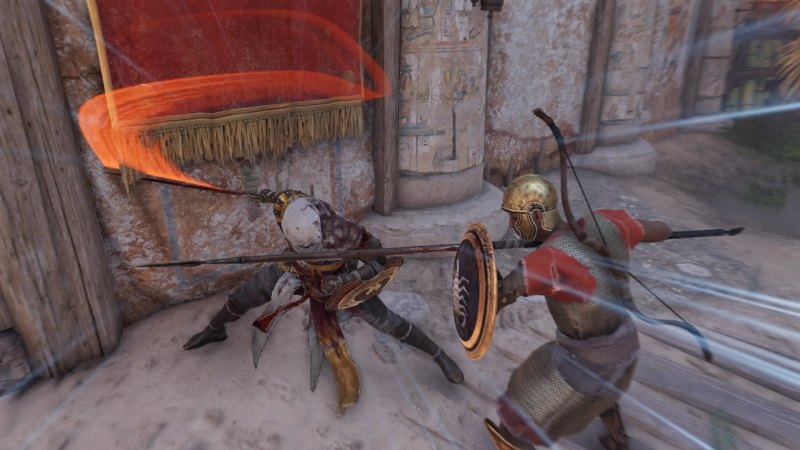
Above: Unleashing a heavy attack to break through the enemy’s shield.
Most of the time, you can avoid combat by using stealth and sneak kills remain satisfying. But when you do end up in a sticky situation, the fighting is flawed but generally solid. When Bayek’s adrenaline bar is full, he can unleash a brutal, bone-crushing overpower move that changes depending on the weapon you’re wielding. You’ll pick up some interesting weapons later on that add an over-the-top element of fun to battles, such as a cursed sword from a side quest. There are varieties of bows to equip, such as the quick-firing light bow and the warrior bow, which lets loose multiple arrows to strike down the enemy.
Your surroundings also comes into play during combat, whether you’re scaling walls to attack your pursuers from a distance or smashing a jar of oil and lighting it on fire. You can always scan your surroundings for solutions, and the enemies telegraph plenty of information so you know when to dodge or when a crushing heavy attack is going to knock your shield out from in front of you.
What you won’t like
Repetitive side quests
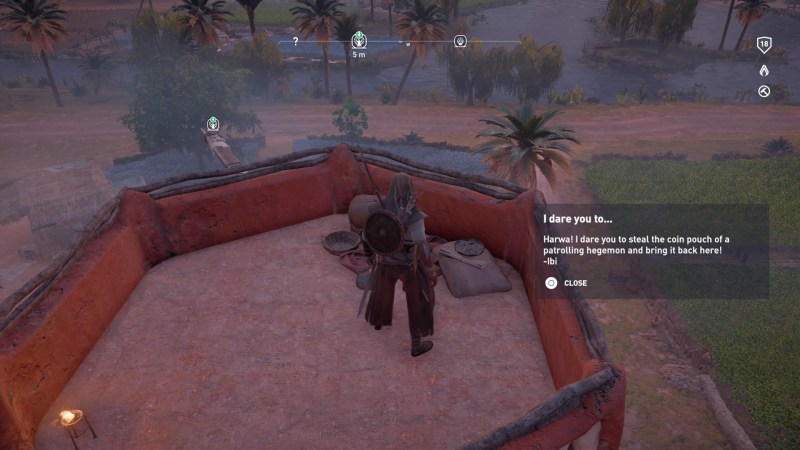
Above: Sometimes you’ll find secret challenges on the rooftops.
Though I appreciate that the side quests are the everyday aspect of life in Ancient Egypt, I can’t help but feel that they’re too repetitive. I’ve infiltrated dozens of enemy camps and hideouts by now, and barring differences in layout, they’re pretty much the same. It feels routine — I send out Senu, Bayek’s faithful eagle, to scout the lay of the land and mark soldiers that I’ll have to take down. Then I sneak in, eliminate the enemy, and plunder the place.
The way you hear about these quests is often from other characters, but you can also search the map for symbols that denote strongholds or mystery locations. When you’re grinding for levels, this can often feel like running errands — going from point A to point B and checking off a to-do list. It doesn’t feel so much like exploring. Not only that, but you won’t be able to tackle all the quests at once. Some are gated behind higher levels, and you’ll have to grind on lower level missions first before you can tackle them. This means accruing experience points bit by bit in a way that feels thoroughly inefficient.
I much prefer the subtler environmental cues you find sometimes, like little notes and challenges hidden on the rooftops, which make you want to explore more and discover secrets.
Switching perspectives

Above: Layla’s computer with a ton of notes and exposition.
Though you’re Bayek for most of the game, there are occasional interludes where you play as Aya and Layla. While I like all these characters, switching perspectives feels more like an interruption than an opportunity to glean insight about the world and what these characters want.
As Aya, you helm a Greek warship called a trireme and unleash flaming arrows, cannonballs, and firebombs on enemy ships. It sounds cool in theory, but the naval battles feel unwieldy and uninteresting. It’s linear, arcade-style combat where she defeats a few oncoming fleets, then afterward, she reaches her destination. When she’s not on the trireme, you get a chance to wield her twin blades, but this doesn’t significantly differ from Bayek’s gameplay. It’s the same sneaking, killing, and looting, just with a different skin.
Layla fares even worse. The first time we meet her, we have a chance to go through her computer and learn that she’s a brilliant engineer who desperately wanted to work on the Animus project for Abstergo. After they steal a few of her ideas and bench her, she decides to build her own version of the Animus. From there, her character doesn’t develop significantly and we don’t learn much more about what’s happening in the modern world.
The politics
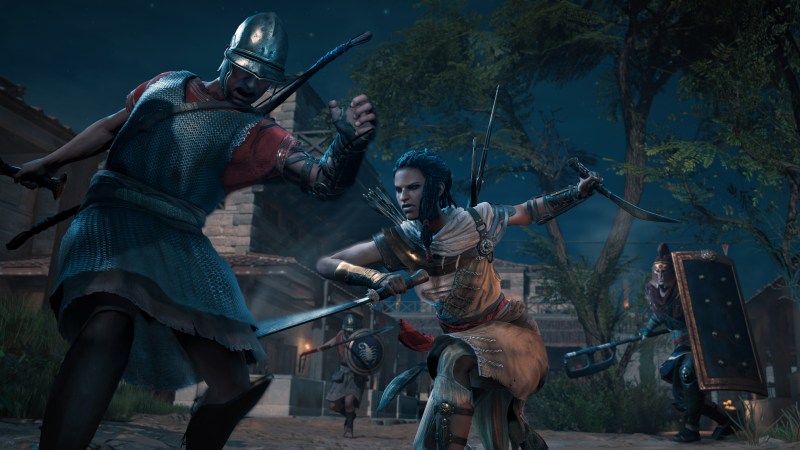
Above: Bayek’s wife, Aya, is out for a vengeance of her own.
Bayek’s actions are contrasted with those of his wife, Aya. She too wants to avenge their son’s death, but she goes about it in a different way. She’s also killed members of the Order, but now she’s aligned herself with Cleopatra and seeks to create a world where no one else will have to experience the trauma of losing a child the way she did.
The problem is that the politics in Origins is a little weak. Whereas the first half of the game is rich with emotional depth and symbolism, the second half becomes increasingly about Cleopatra and Caesar’s machinations — yet we never learn that much about them or their motivations. As it moves away from a story about two people who have lost their son and becomes more about power struggles, betrayal, and subterfuge, the story begins to feel less and less urgent.
Even though Bayek and Aya continue to assassinate and take down key villains, they begin to feel like bit players in a larger plot. Though you can still explore an open world, the game begins to feel more and more linear. It’s somewhat demoralizing, making you feel less like you’re allowed to roam freely and more like you’re being railroaded along because of characters you don’t very much care about.
The gameplay doesn’t match the story
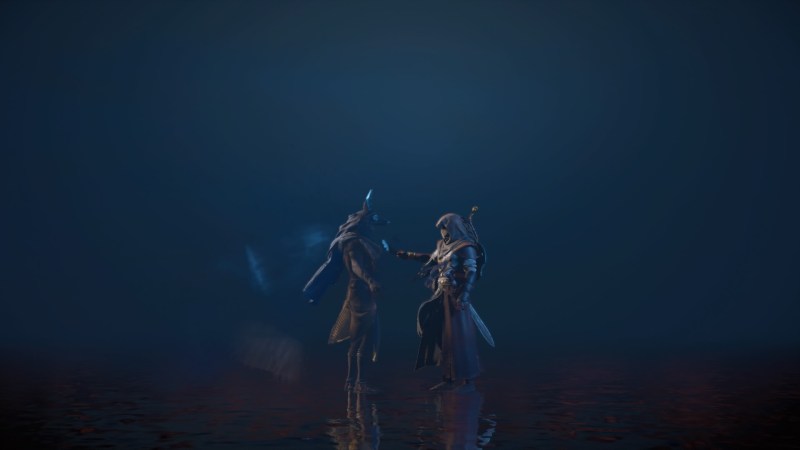
Above: Bayek and one of the Order of the Ancients in Duat.
My biggest complaint is Origin’s uneven handling of story and gameplay. It’s partially because it’s open world — even though Bayek’s story is dramatic, you’ll have to take a break to run errands for the local villagers, which disperses the tension. But it’s also because of how understated certain major game events feel. Even though he’s been hunting the Order across the land, Bayek’s eventual encounter with one feels like any other mission. Most of the time, you end up infiltrating their base, stealthily dispatching their guards, and then landing a death-blow on them like they’re any other character. Throw it all together and the tone feels inconsistent, breaking immersion for what I find a compelling story about a man’s quest for redemption and revenge while staying true to his principles.
I also wish there were more boss fights. There are two terrific ones, which I won’t go into too much detail because they’re really awesome when you’re blindsided by them. The battle against Apep the eater of souls is fantastic because of the visuals as well as the symbolic meaning for the story. I want more of that.
Conclusion
Assassin’s Creed: Origins offers a rich world and a compelling story at first, but it’s waylaid in part by the repetitive side quests and a weaker second half. It has secrets to find, but you’ll have to go looking for them — and you’ll have to do a lot of grinding along the way.
If you’re hoping to learn more about the Animus and Abstergo, then you’ll be disappointed because you’ll spend most of the game in ancient Egypt. But if you just wanted to show up and kill some dudes while touring the pyramids and gawking at the splendor of Alexandria at the height of its glory, then you’ll come away satisfied.
Score: 75/100
Assassin’s Creed: Origins is out on October 27 on PC, Xbox One, and PlayStation 4. The publisher sent us a code for review.
